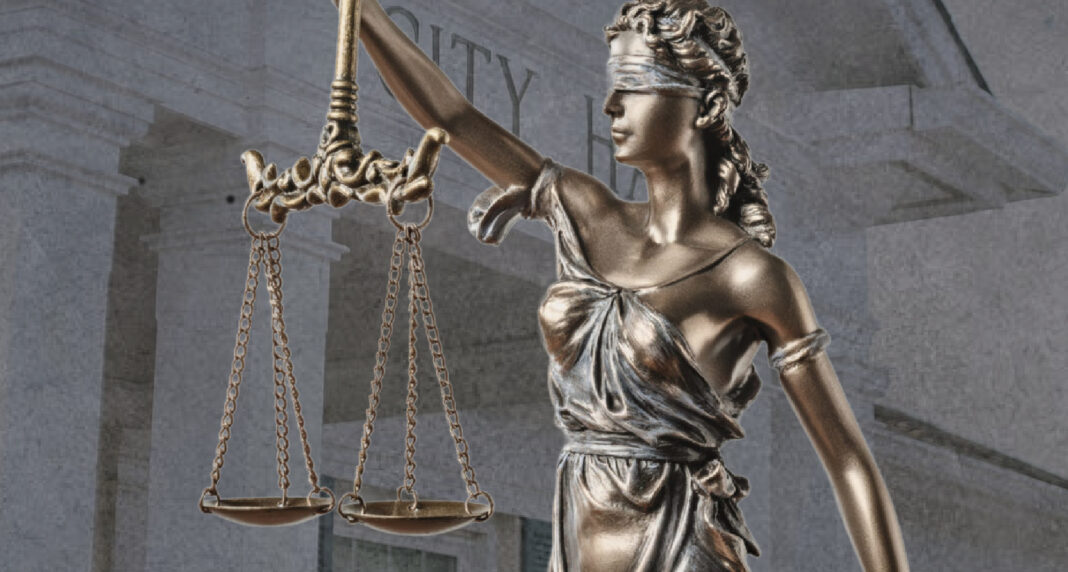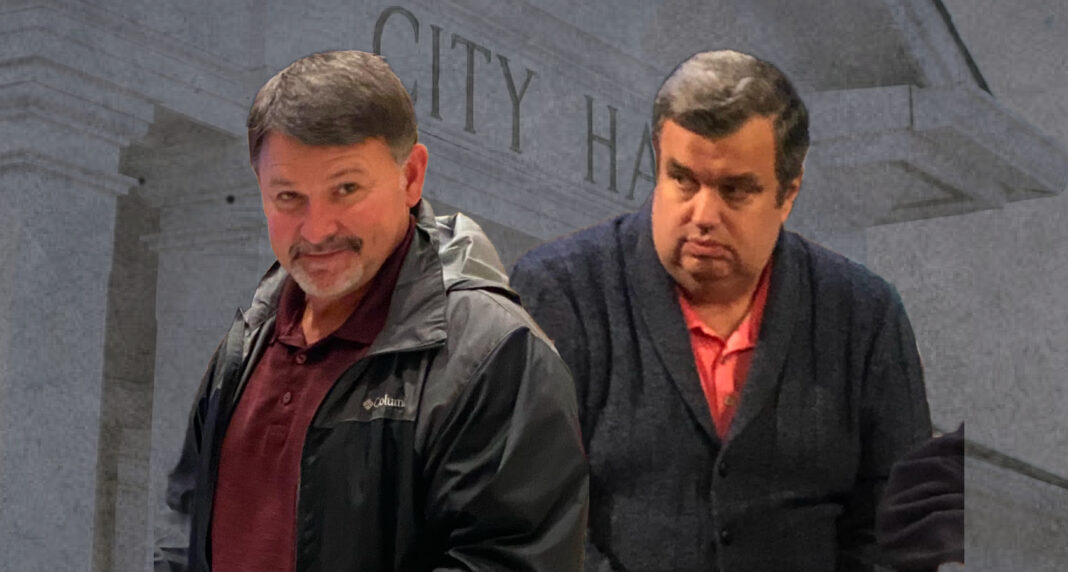OCEAN SPRINGS, MS – Newly obtained emails allegedly show that Ocean Springs City Attorney Robert Wilkinson secretly coordinated with Securix attorneys to pursue criminal charges against Amy Divine, a plaintiff in an ongoing class action lawsuit over the city’s now-defunct traffic enforcement program.
Wilkinson has been accused of playing both sides by simultaneously representing the city and Securix, the private company Ocean Springs contracted with to help ticket uninsured motorists. Many have considered the connection to be a severe conflict-of-interest.
Ms. Divine, a resident of Madison County, received a citation in the mail after cameras in Ocean Springs tagged her vehicle as being uninsured. Divine hired a lawyer and eventually sued Securix in federal court over the legality of the program. Only after the lawsuit was initiated did efforts to pursue criminal charges begin — with the help of the Ocean Springs City Attorney.
“Please consider charging Ms. Divine since she violated the diversion program,” Gulfport attorney Tim Holleman, who represented Securix in the lawsuit, wrote in an email to colleague Robert Wilkinson in December 2022.
Shortly after, Holleman confirmed Wilkinson was in.
“I have Robert to make sure the city charges Ms. Divine,” Holleman emailed to Securix executives one hour later. “I have spoken to Robert [and] he is meeting with the Judge and police chief next week… hopefully charging Divine.”
These emails suggest that Wilkinson — who has repeatedly claimed to have “recused himself” due to conflict of interest — was not only still managing the program behind the scenes, but was actively participating in what appears to be a coordinated effort to initiate criminal charges against a woman who had filed a civil lawsuit — a move that raises serious concerns about potential retaliation.
Although he claims recusal, a string of emails acquired by GC Wire reveal anything but. In the emails, which span two years, Wilkinson is seen playing a role in the daily operations of Securix, both as City Attorney and a representative of Securix.
Wilkinson Steered City Court Towards More Profits for Securix
Wilkinson had several contacts with Judge Calvin Taylor, who presided over the Ocean Springs Municipal Court at the time.
In one of the most damning exchanges, Wilkinson wrote to the judge providing strategic legal direction on how to run plea hearings for defendants caught in the Securix uninsured motorist program.
“It may be beneficial for someone to tell the individuals if they did not have insurance on the date of the ticket they will be found guilty and their license will be suspended unless they choose to enter the Diversion Program,” Wilkinson wrote to Judge Taylor on Feb. 22, 2022. Judge Taylor did not respond to this particular email in the thread.
Why is this significant?
Because Securix only profits if defendants choose diversion – a short video program that allows those ticketed to pay a fee to Securix and avoid court. If someone pleaded or was found guilty in Judge Taylor’s courtroom, the company would have earned nothing. Wilkinson was directly steering court proceedings to favor Securix’s business model seemingly under the color of the sitting City Attorney.
State Oversight Triggered by Citizen Complaints
Wilkinson’s actions didn’t go unnoticed. After months of public criticism, lawsuits, and citizen complaints about Ocean Springs’ Securix program, a state oversight board began investigating whether Wilkinson violated ethical or professional standards in his dual role. The central question: Did he truly recuse himself, as he claims?
In his April 2025 defense packet to the board, Wilkinson painted a clear narrative — one that now appears entirely false.
He claimed that once it became clear he had a potential conflict of interest, he stepped away from advising the city on the program. He said another attorney, Amy St. Pé, took over advising the city. He stated that his only involvement was limited and passive. He claimed he had no hand in the day-to-day operations of the program.
But the emails tell a different story — one of deep involvement, active coordination, and direct influence over the city’s courts, police, and public messaging. Additionally, public records requests, as well as confirmation from City Clerk Patty Gaston, reveal there are no records of Amy St. Pe being hired by the city to advise them in Securix related matters.
What He Told State Investigators — Versus What Really Happened
In his letter to the oversight board, Wilkinson stated, “At all times I disclosed my representation to Securix and recused myself from providing legal advice to the City.” But in reality, he was deeply embedded in the program’s operations.
WIlkinson sent legal materials to Municipal Judge Calvin Taylor, advising him on how to guide defendants into Securix’s paid diversion program — the only outcome in which the company profited. He coordinated directly with Securix executives on court scheduling, public messaging, and how to handle citizen backlash. He even told another Securix attorney that he would meet with the judge and the police chief to pursue criminal charges against Amy Divine, the woman suing the program.
And in one email, Wilkinson went so far as to describe himself as “the face of Securix” to the mayor and board — a statement that not only contradicts his claim of recusal, but undercuts the defense offered on his behalf by city officials.
That admission came in a March 2023 email, when Wilkinson was attempting to manage the fallout from an incident involving a Securix employee and local resident.
In the email, he wrote, “I make the following observation since, to the Mayor and Board, I am the face of Securix. I am also the one that is embarrassed when citizens come to the board and complain about multiple tickets.”
The statement is not just revealing — it is devastating to Wilkinson’s credibility. It directly contradicts the narrative he gave to the state oversight board, in which he claimed to have stepped back from all involvement in the program. Even more troubling, it undermines the sworn letters of support submitted on Wilkinson’s behalf by Mayor Kenny Holloway and Aldermen Rickey Authement, Mike Impey, and Rob Blackman — all of whom insisted that Wilkinson had no role in administering the Securix program.
But Wilkinson’s own words prove otherwise: he wasn’t just involved — he was the embodiment of the program in the eyes of city leadership.
And, despite his repeated claim of having nothing to do with Securix in Ocean Springs, city officials continued to lean on Wilkinson for legal questions about the program. “I received a call this morning from an alderman indicating that he had received information about Securix investigating individuals,” Wilkinson wrote in one email to Securix executives.
That same alderman, according to Wilkinson, questioned where Securix got the authority to investigate citizens. Wilkinson didn’t refer him to another attorney. He didn’t recuse. Instead, he helped craft the damage control — advising Securix leadership on how to avoid a lawsuit and telling them which employee should never return to Ocean Springs proceedings.
This interaction, as well as dozens of others revealed in the emails, shatters the credibility of the officials who defended Wilkinson.
Mayor Kenny Holloway and Aldermen Rickey Authement, Mike Impey, and Rob Blackman each submitted formal letters to the oversight board swearing that Wilkinson had no role in the administration of the Securix program. Some stated they never consulted him. Others said he never advised the board. All four statements now appear demonstrably false.
Authement’s reversal is particularly glaring. Before losing his re-election bid earlier this year, Authement told GC Wire he had never been informed of Wilkinson’s conflict and expressed concern about the city attorney’s financial ties to the program. He even went so far as to make a motion to replace Wilkinson due to the undisclosed conflict-of-interest.
But after his electoral defeat, Authement submitted a letter telling the oversight board the exact opposite — that Wilkinson had been transparent and properly recused. The emails — and Wilkinson’s own admissions — prove otherwise.
These contradictions have led many to question whether city officials made a coordinated attempt to mislead investigators and the residents of Ocean Springs. Whether motivated by loyalty, pressure, or self-preservation, Ocean Springs officials are now on record telling the state a version of events that was directly contradicted by the city attorney they were defending.
Consequences Loom for Wilkinson and City Officials
The implications of these revelations extend far beyond public embarrassment.
If Wilkinson used his government office to help initiate criminal charges against a woman who was suing the city — and did so at the request of the company he was also representing — that could form the basis for civil rights violations under federal law, including First Amendment retaliation and abuse of process. Legal experts reviewing the Divine case may now have additional grounds to expand that lawsuit or seek sanctions against the city and its attorneys.
On the state level, Wilkinson faces potential disciplinary action from a Mississippi oversight panel where the complaint was launched. If the oversight board finds that he misrepresented the extent of his involvement, failed to recuse appropriately, or weaponized his role to harm a civil plaintiff, professional sanctions could follow — including suspension or disbarment.
But Wilkinson may not be the only one in jeopardy. City officials who submitted statements that are contradicted by evidence — or who enabled retaliation against critics — could face accountability of their own. If investigators determine that elected officials obstructed or distorted the review process, their conduct could trigger further inquiries or lead to additional complaints to various state or federal agencies.
Meanwhile, the political fallout in Ocean Springs is already underway. Most of the city’s elected officials were swept out in a wave of voter frustration – fueled by scandals like this one. New leadership takes office in July — and with it comes the question: Will the city take steps to hold the previous administration accountable, or quietly bury what has been brought into the light?



I have been reading your stories on GC Wire for quite a while now. I am always surprised at the corruption that has been going on in Ocean Springs. The current administration is guilty of using an attorney that they have no contract with. And the good old boy system is still working with many writing letters regarding this attorney. They all need to be prosecuted for what they have done and Wilkinson needs to be disbarred.